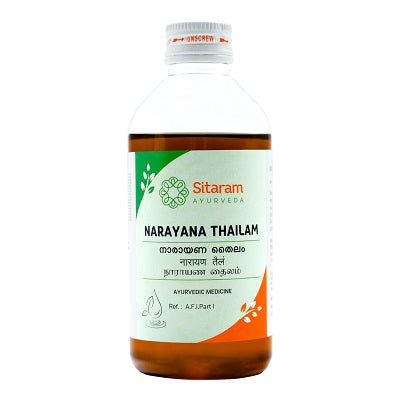Skip to product information

Narayana Thailam is a medicated oil described in the Ayurvedic classical textbook Bhaishajyaratnaavali. It is explained in the context of 'Vatavyadhi', or diseases arising from deranged ‘Vata dosha’ in the system.
This medicated oil is a combination of several herbs like Punarnava (Boerrhavia diffusa), Dasamoolam etc. in a warming base of sesame oil.
Narayana Thailam is commonly used in musculoskeletal disorders and degenerative diseases. It is one of the widely acclaimed for its pain-relieving effect. Commonly used for Abhyanga (body massage).

narayana thailam 200 ml
₹300.00
Reliable shipping
Flexible returns